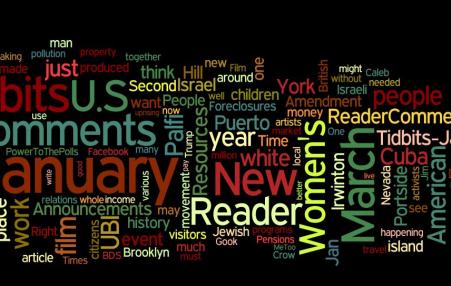The Great Land Robbery
The Atlantic
 Reader Comments: Puerto Rican Foreclosures; Israeli Teens Refuse Army; Israel Bans BDS Supporters; Worker Safety; Pension; Free Market; Settler Colonialism and the Second Amendment; Nuclear Testing; Pollution from U.S. Military Bases - in our country; U.S. history - Jim Crow South; Record Numbers Visit Cuba last year (from the U.S.); Women's March 2018 - January 20; Resources, Announcements; and more.....
Reader Comments: Puerto Rican Foreclosures; Israeli Teens Refuse Army; Israel Bans BDS Supporters; Worker Safety; Pension; Free Market; Settler Colonialism and the Second Amendment; Nuclear Testing; Pollution from U.S. Military Bases - in our country; U.S. history - Jim Crow South; Record Numbers Visit Cuba last year (from the U.S.); Women's March 2018 - January 20; Resources, Announcements; and more.....
 "Mudbound" is about how things change—slowly, unevenly, painfully. It is also, as the title suggests, about how things don’t change, about the stubborn forces of custom, prejudice and power that lock people in place and impede social progress. Set mainly in the Mississippi Delta in the years just after World War II, when Jim Crow was still enshrined in law and practice, the film tests and complicates Faulkner’s much-quoted claim about the not-even-pastness of the past.
"Mudbound" is about how things change—slowly, unevenly, painfully. It is also, as the title suggests, about how things don’t change, about the stubborn forces of custom, prejudice and power that lock people in place and impede social progress. Set mainly in the Mississippi Delta in the years just after World War II, when Jim Crow was still enshrined in law and practice, the film tests and complicates Faulkner’s much-quoted claim about the not-even-pastness of the past.
 In nine states from Nevada to Tennessee, anyone who has lost been imprisoned and lost thier right to vote, cannot regain it until they pay off any outstanding court fines, legal fees and victim restitution. In Alabama, that requirement has fostered an underclass of thousands of people who are unable to vote because they do not have enough money.
In nine states from Nevada to Tennessee, anyone who has lost been imprisoned and lost thier right to vote, cannot regain it until they pay off any outstanding court fines, legal fees and victim restitution. In Alabama, that requirement has fostered an underclass of thousands of people who are unable to vote because they do not have enough money.
 Even in the era of the Beatles and Motown's roster of stars, the brilliant James Brown established a place that was his alone. His was not about magic, it was about power that could not be denied by anyone brought within its field of influence. What the book's author also finds is a wary solitariness that paradoxically found its fullest expression in Brown's ability to give himself so completely in performance to suggest a generosity approaching self-immolation.
Even in the era of the Beatles and Motown's roster of stars, the brilliant James Brown established a place that was his alone. His was not about magic, it was about power that could not be denied by anyone brought within its field of influence. What the book's author also finds is a wary solitariness that paradoxically found its fullest expression in Brown's ability to give himself so completely in performance to suggest a generosity approaching self-immolation.
Spread the word